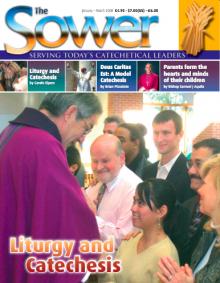I was sitting about 20 feet from the steps going up to St. Peter’s Basilica on April 19, 2005, when the smoke went up from the stack of the Sistine Chapel. Joseph Cardinal Ratzinger had been elected as the 264th Successor of St. Peter. My heart raced with anticipation to see my new Holy Father. One could see in his eyes humility, and perhaps a bit of disbelief, that Almighty God had chosen him to lead his family on earth. God called Abraham to do great things when he was 75 years old. Cardinal Ratzinger turned 78 years old three days before he was elected as Pope Benedict XVI.
I eagerly awaited Pope Benedict’s first encyclical, Deus Caritas Est, a quote from 1 John 4:16 which means ‘God is Love.’ This would be the first dogmatic treatise on love in the history of the Church. Since then, the more I have taught from, and reflected upon, this encyclical the more I have realized that it is a model of catechesis. Pope Benedict takes into account all of the important aspects of catechesis.
The initial proclamation of the Gospel message has as its aim to illicit an initial moment of conversion and faith. What about catechesis?
‘The specific character of catechesis, as distinct from the initial conversion-bringing proclamation of the Gospel, has the twofold objective of maturing the initial faith and of educating the true disciple of Christ by means of a deeper and more systematic knowledge of the person and the message of our Lord Jesus Christ.’ (Catechesi Tradendae 19)
In his encyclical, Pope Benedict is giving us a catechesis on love, in both its both human and divine aspects, but he is also aware that, in catechetical practice, one must take account of the fact that ‘the initial evangelization has often not taken place.’ (CT 19) He therefore tells us, ‘I wish to emphasize some basic elements, so as to call forth in the world renewed energy and commitment in the human response to God's love.’ (Deus Caritas Est 1)
The rest of this online article is available for current Guild members.
This article is from The Sower and may be copied for catechetical purposes only. It may not be reprinted in another published work without the permission of Maryvale Institute. Contact [email protected]

















